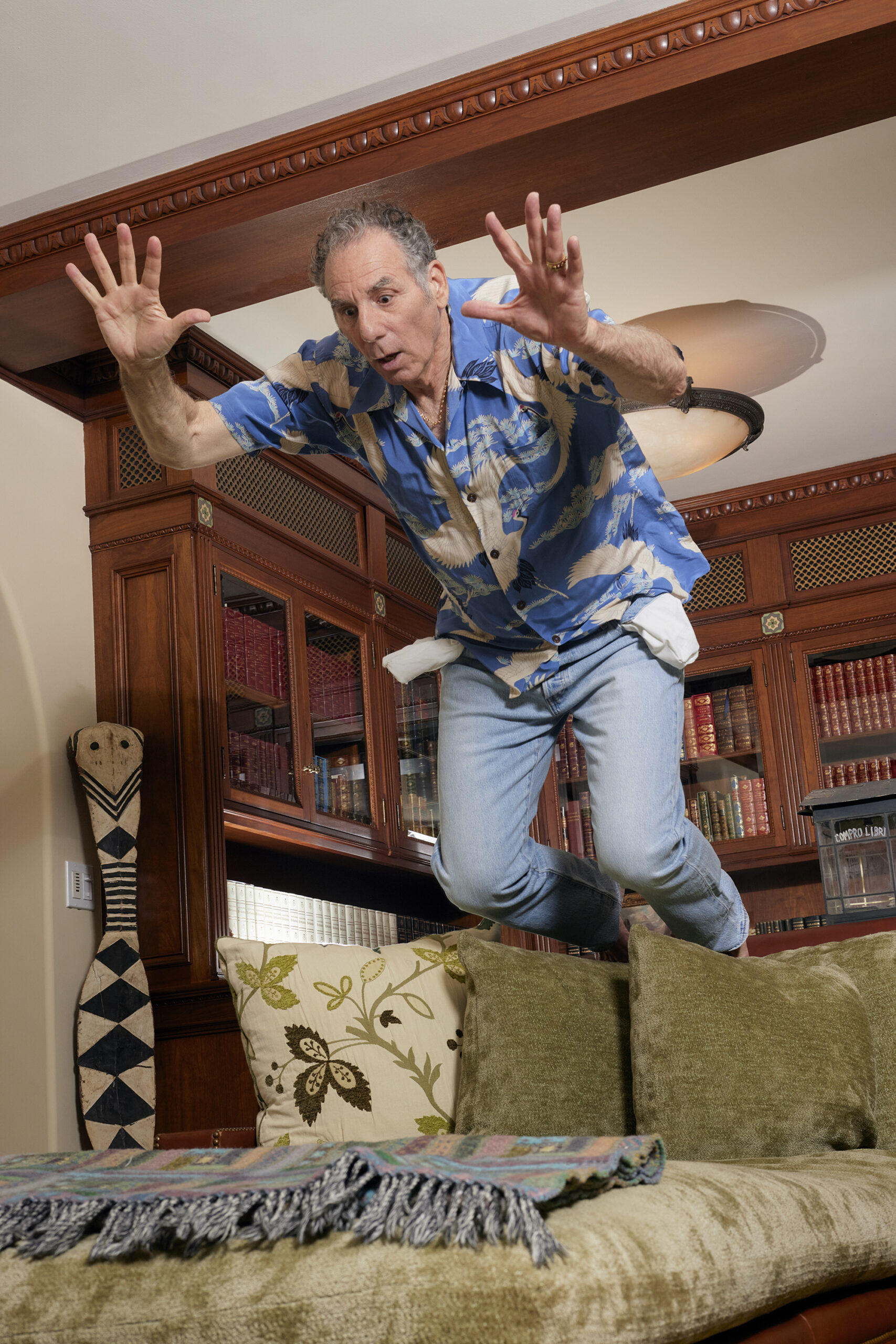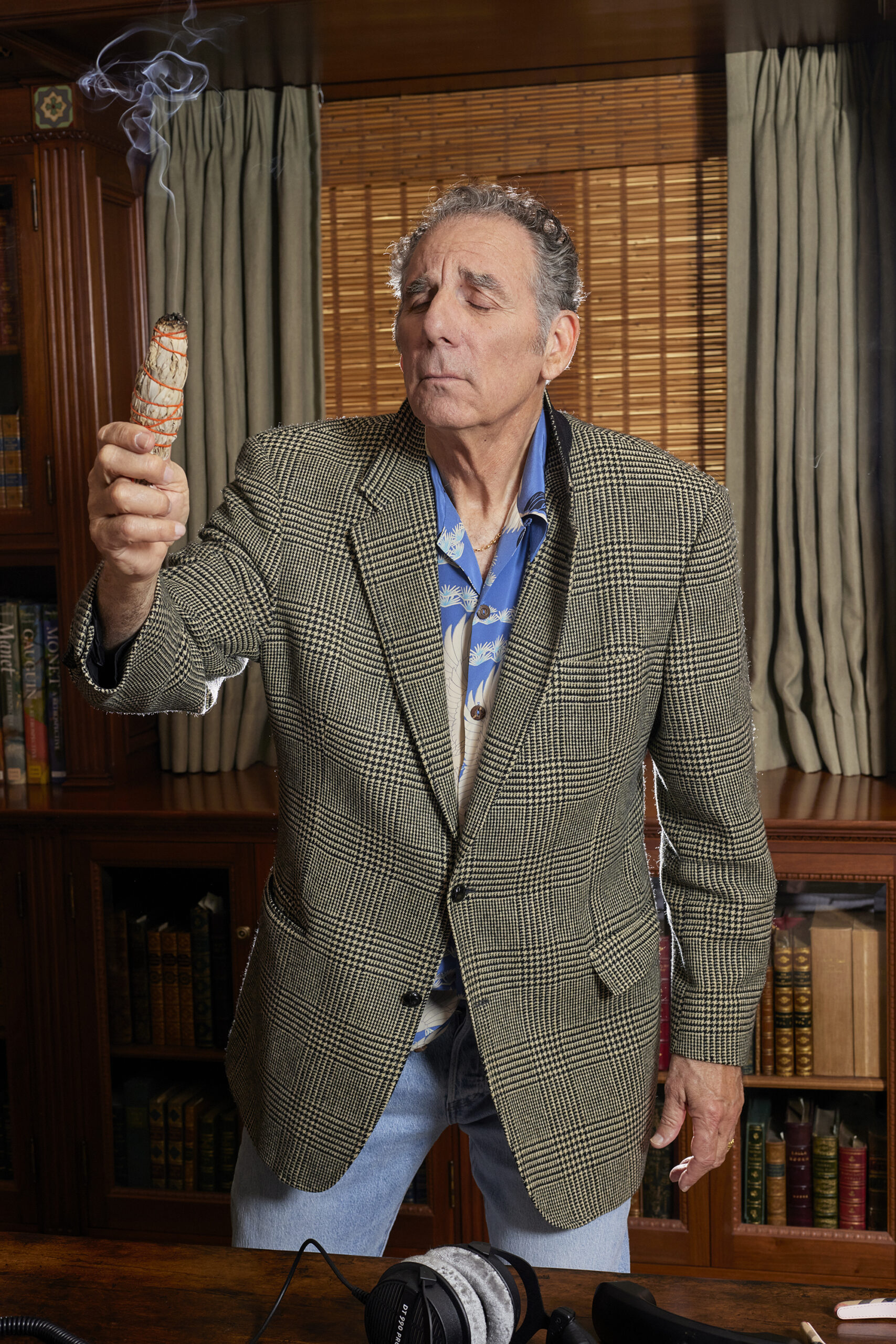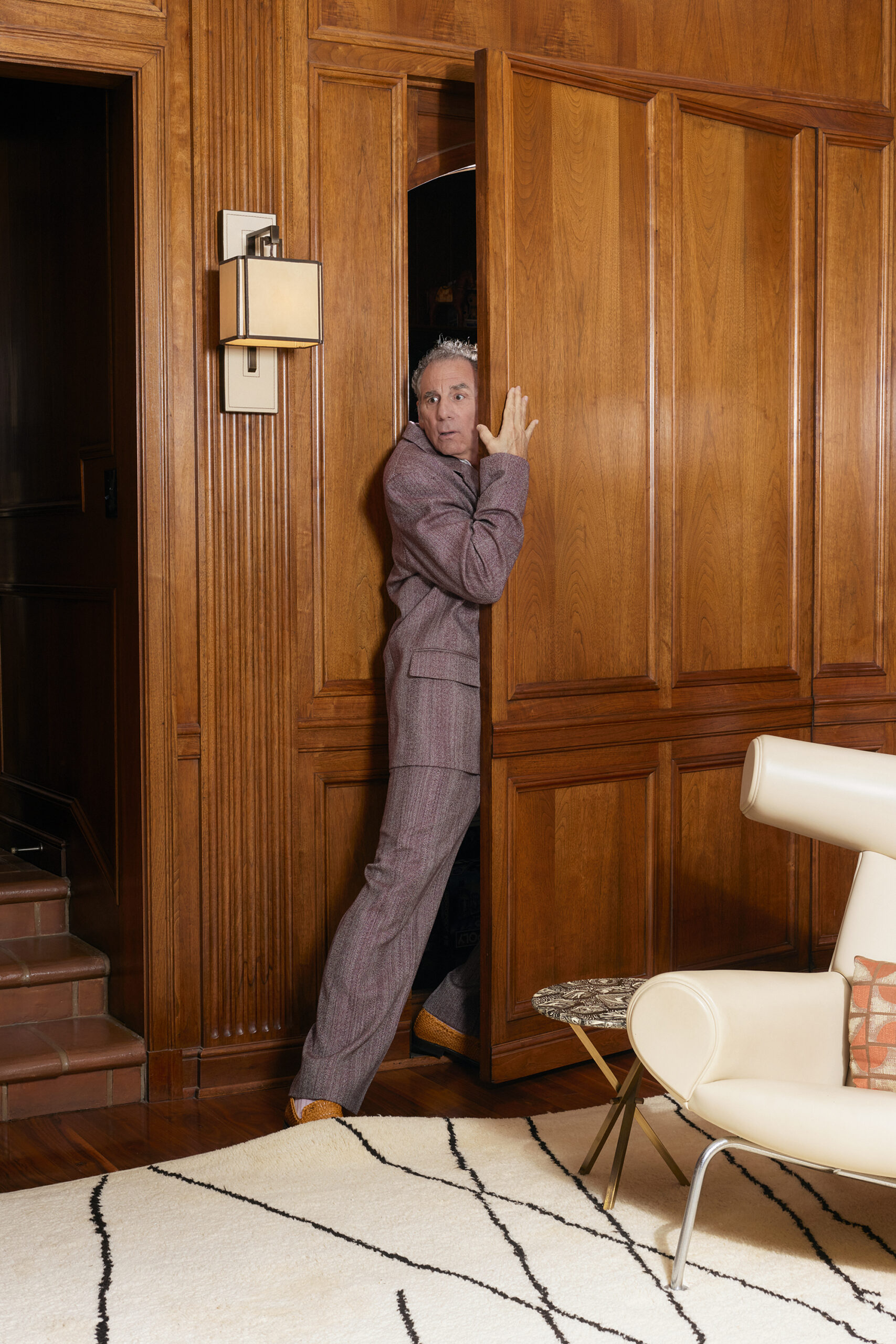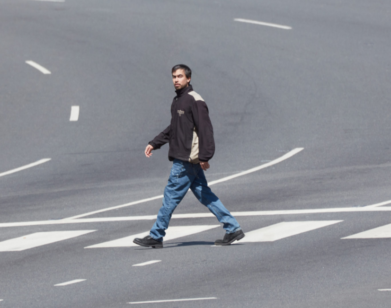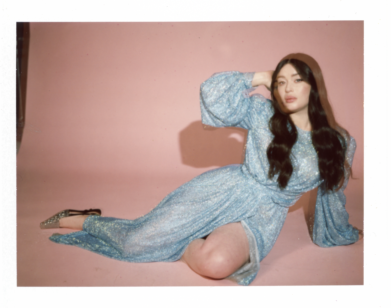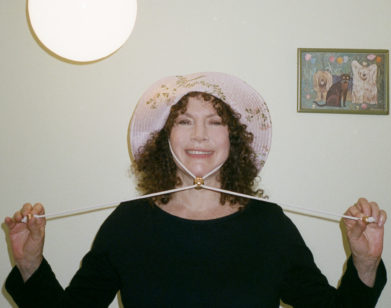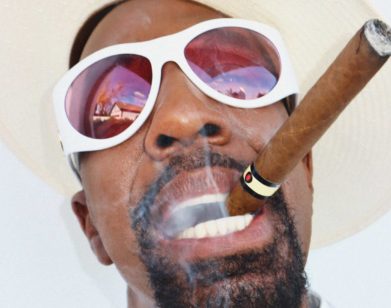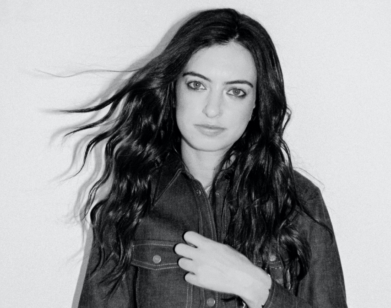KRAMER
“Like Setting Fire to Myself”: Michael Richards, in Conversation With Jay Leno
There are two things everybody knows about Michael Richards. In the ’90s, he ascended into the pop culture pantheon as Kramer on Seinfeld. In the aughts, his career and reputation suffered a body blow after he was filmed shouting racist insults at hecklers during a stand-up set. But what about the before and after? What led Richards to comedy greatness and what happened after it all went away? After years of soul-searching, answering those questions was the reason for writing his new memoir Entrances and Exits, which, as he tells his old friend Jay Leno, was his way of stepping back out into the world and saying hello.
———
TUESDAY 11AM MARCH 12, 2024 L.A.
JAY LENO: Michael, it’s good to see you again. It’s been a long time.
MICHAEL RICHARDS: Yeah, it has.
LENO: You’re a big book collector.
RICHARDS: I am.
LENO: What’s the oldest book you have?
RICHARDS: I go back to the 19th century. I began by studying American literature, then I started to collect it.
LENO: Education is something you seek, right? Were you a bad student?
RICHARDS: I just didn’t pay attention. I wasn’t interested, and that was a danger until eighth grade. And then there was acting. Some students came into my English class from a drama class, and I saw them acting. I immediately got interested.
LENO: You suddenly realize, “This is what I want to do.”
RICHARDS: Yeah. Isn’t it amazing how that works out?
LENO: Well, you grew up in California where it was normal.
RICHARDS: Normal to be what?
LENO: To be in show business. Being from Andover, Massachusetts, I always remember hearing my mother’s friends saying, “Cathy’s boy wants to be a comedian. He’ll grow out of that. It’s not possible.” I remember my neighbor saying, “You can’t be a comedian unless your father was a comedian. That’s the way it works in Hollywood.” Show business is one of those few areas where people who know nothing about it feel free to give advice. But you grew up here, so if you’re not actually in it, you were near it.
RICHARDS: Yeah. I was playing in the backlot of MGM Studios by the time I was 7, but I didn’t really know what it was. I watched Laurel and Hardy on television. I liked seeing their antics. I think I was absorbing all of it.
LENO: I’m trying to remember where I first saw you.
RICHARDS: Probably falling all over at the Improv.
LENO: Right. Just expressing yourself—not verbally, but physically. I’m a verbal comic, so when I see someone do the exact opposite, I’m always amazed. There was something behind the physicality that touched an emotion. I remember we ad-libbed that whole thing your first time on The Tonight Show. You came out as the character Dick Williams.
RICHARDS: I was so respectful because we were going into that without a script, and you trusted me.
LENO: I knew you’d be funny. And of course, [Jerry] Seinfeld saw you on the show.
RICHARDS: Jerry was watching the show that night, and he called Larry [David] and said, “You know Michael Richards? I saw him on The Tonight Show, and I think he could play Kessler,” which was the name of the Kramer character in the beginning.
LENO: I think you came out smoking, which made me laugh because I thought that was the funniest thing, that you’re smoking as a physical fitness instructor. It killed me. But you never did traditional stand-up, correct?
RICHARDS: No, I was never a stand-up comic. You were great.
LENO: I appreciate that.
RICHARDS: You were very prepared, always working on new material. I recognize the proficiency of being a great stand-up comic, but I was more knockabout. I’m an actor. I went raw. Every night something weird was going to go down. Sometimes it worked, sometimes it didn’t. I remember one night I was on that stage, and I set myself on fire. I said I was going to sacrifice myself to the comedy gods. I tried some routine, I was bombing, so now I light my tie and, “I don’t know how I’m going to get out of this.” And you rushed on-stage with a glass of water and put it out, and you had a good line because you got a huge laugh. But I’ve always wanted to ask you, how did you know to get up on that stage with a glass of water? Because I don’t know where I was going with that.
LENO: Because you were on fire!
RICHARDS: And you knew I would probably go up in flames like an anti-war activist or something.
LENO: It reminds me of Larry David.
RICHARDS: Really?
LENO: Well, in the sense that—I am so happy for his success.
RICHARDS: Indeed.
LENO: When I see him on Curb Your Enthusiasm smiling and laughing—because there was me and Seinfeld and we were traditional stand-ups, and then Larry would get up and do stand-up, and it didn’t work because it wasn’t funny. The audience didn’t quite get it, and he’d be so angry that his shit didn’t work. So when I see him now, I’m so happy for him. We were never particularly close. I knew him, of course. But I would watch him and I’d go, “He was pretty funny. Why wasn’t anybody laughing at that?” He didn’t have it totally polished yet, but you could see the germ of the original idea. He didn’t quite pull it off, but it was funny. Seinfeld and I were more wordsmiths, and in the same way that we take words that are not funny and get humor from it, you take physical actions that would seem normal or not anything special, and get a big laugh with it.
RICHARDS: I think that’s why that sketch worked so well on The Tonight Show. Because we had body and mind working together. You would set me up, physically.
LENO: I loved being the straight man.
RICHARDS: I was very awkward on your shows. I didn’t know how to come out as myself. I was so inside the Kramer character, and the way in which I could get a laugh from doing physical comedy. But I was uncomfortable being myself, just having a conversation. I felt like I had perform, but how do I perform? Because I’m not rehearsed. I don’t really have a scene to do. So I looked like I was just a little bit out of control.
LENO: But out of control is what makes it funny.
RICHARDS: I suppose so.
LENO: I like the fact that you would interpret it differently. It’s like speaking a foreign language, like saying something in one language and then someone translates it. I would give you the verbal, and then you would give me the physical interpretation of what I just said. That’s what made it fun to watch.
RICHARDS: You asked me to come on the show one time. It was something we were doing after 9/11 and you were auctioning off a motorcycle. And I was backstage ready to come on, and at the last minute I said to your line producer—I don’t know what got into me—I said, “Should I just go out there in my underwear?” I was kind of kidding, but she said, “Do it.” The next thing I knew, I took my pants off and walked out. And your line was, “Did you just get out of the hospital?” And of course, I felt like I went way over the top, I shouldn’t have done that. Why can’t I just come out and be myself?
LENO: It killed.
RICHARDS: Yeah. Speaking of that, the incident at the Laugh Factory 18 years ago—
LENO: I had my own take on that, and you tell me if this makes any sense. When you’re a comic, if something is really funny, it’s not offensive. All bets are off. I sensed that with your anger, somehow you thought it was funny. It just struck me as, maybe you were trying to do something that just didn’t work. It just didn’t. Maybe you thought the anger would be funny, because I know you, you’re not a racist person or anything like that.
RICHARDS: No.
LENO: And this is the era we live in now, because every mistake is on your permanent record. I did nine Asian-American jokes over a 12-year period, and this Asian group kept getting mad at me for them. I apologized to them, never did it again. But just last week I google “Leno attacks Asian group,” and then I look and it says October 2011 in tiny writing. But it looked like it just happened yesterday. So it just goes on your permanent record.
RICHARDS: Yeah, it does.
LENO: Because I remember that incident happened and you went back the next night and performed again. It wasn’t until it became public.
RICHARDS: Yeah.
LENO: Obviously it was wrong, I’m not condoning what you did. But sometimes as an artist, you get attacked, and the success you had, to be treated as someone who didn’t matter, you just lash out. I think everybody’s done it in some form or another, but it dissipates fairly quickly. “I’m sorry I said that. I’m glad nobody heard that.” But unfortunately in your situation, the whole world heard it.
RICHARDS: The phone was on. That was a first. I know a lot of comics got worried that they could get their acts video’ed, and then taken out of context, and then all kinds of trouble would happen.
LENO: Right.
RICHARDS: I was going for a laugh on that. I thought it was so preposterous to use the N-word.
LENO: Well, that’s what I’m saying.
RICHARDS: I was sort of in character, just a loudmouth idiot.
LENO: That’s what I thought as I watched it all.
RICHARDS: Yelling out the N-word. And then when it all fell apart and I wasn’t getting it, I went into anger because I didn’t like being interrupted in the first place, and then it got completely out of control. But I have to say, there’s always been an edge to my act, being somewhat out of control. Like setting fire to myself.
LENO: And when it works, it works spectacularly. When it fails, it fails spectacularly. I’d like to think I know your heart and I know that’s exactly what it was. But it’s a case of time heals all wounds, isn’t it?
RICHARDS: Yeah. It took me a little time to get over that. I was deeply wounded. But I was questioning myself up there anyway. I’d been working about nine months doing about 11 shows a week. Sometimes I’d do three shows a night. And it was coming along, but that night, it was just the way it went. And I was thinking about not being as funny as I wanted to be. Being only nine months in, I thought, “This is going to take a few years.” But my bar was set so high, as high as it was doing Kramer. You know how it is. I come on the stage, the audience goes wild, and they’re thinking, “Okay, now we’re going to see something. This is the guy from that show. Here we go.” And I’m out there working on material or improvising.
LENO: There’s an old saying: “You never create anything bigger than your act.”
RICHARDS: Never create anything bigger than your act?
LENO: For example, Bill Cosby. Is he a great comedian or a predator? I’m sorry, but now he’s a predator. I mean, we all loved him. He was wonderful to me. But he’s a predator now.
RICHARDS: Indeed. I’m tainted from this. The New York Post brought it up just a few months ago. It’s not going to go away, so people look at that almost as if it happened today. So it’s on me.
LENO: And plus, as a comedian, people always think you’re being funny. Because I remember when you went on Letterman and instead of saying African-American, you said Afro-Americans. People laughed, and Jerry said, “No, he’s not being funny here.” But your way of being is so funny and so humorous, even when you’re being serious.
RICHARDS: Well, I am a fool by nature. So I’m going to slip up again if I’m not careful. I bring about the pratfall, it’s just something about me. As soon as that came out, I said, “Oh, now I’m going to get nailed for this.” I’m not speaking correctly. The difficulty in doing that—particularly then on the Letterman show, I was a wreck.
LENO: I remember.
RICHARDS: And nothing was prepared. I had no publicist. I just went on there. Jerry said, “Come on, you have to do it.” I said, “I do need to apologize, but at the same time, I’ve got to get this straightened out in myself.” So I went out and did the apology, and then I said, at the end of it all, “I’m going home.” It’s just about doing some personal work. And that’s what I did. I gave up everything. There wasn’t any more show business for me.
LENO: But obviously you’ve learned from the experience.
RICHARDS: Well, yeah. I certainly wouldn’t be out there throwing that word around to see if I could get a laugh. It was tough being in the club at the time with so many Black comics using the N-word, and it was all in the air. I think I was probably the first white guy who threw it out there to see where it was going to go. And of course, it blew up in my face. As it should, because god, what it brings up for Black people. So I took it on the chin and I’m sorry.
LENO: But it’s interesting how our lives shape who we are. People say to me, “What would you change?” I go, “Nothing, because I learned something from every experience.”
RICHARDS: That’s the way it is.
LENO: It gives you empathy as a performer to help shape who you are. I had enough bad experiences in clubs that, when I finally did get onstage, I would know not to do what you did, because I just had more stage experience. And you realize how much effect words have. The right funny word gets a big laugh. And you realize saying the wrong word can do the same thing as well.
RICHARDS: Yeah, and it was very late at night, and I didn’t bill myself. I was always coming in as a guest. So that allowed me to be free enough to fail that night. And I did indeed fail.
LENO: Let me ask you another question and tell me if this is off-limits. Reading about your mother’s trouble with mental illness, and your grandmother, did you ever think that could be some hereditary thing?
RICHARDS: Possibly. I’m touched. I’m a bit odd. I’ve always recognized that and it played well in doing comedy.
LENO: But that’s the wonderful thing about show business, because I thought I was different from other kids. And then I came here and I met all these other odd people. It’s like you and I have nothing in common, but we do have a common bond in the fact that we’re odd and we’re attracted to this show business thing. I have so many professional friendships because there’s no other people that do this. I don’t really dislike other comics. I like them all because they’re the only other people that understand what I do.
RICHARDS: It’s interesting to me how my background has led to so many things. My grandmother was taking care of me up until I was almost seven, and she was schizophrenic. And part of bringing her back was, “Ma.” Calling out to her, and she’d come back. It got to a point where she didn’t come back at all. She had to be committed to Norwalk State Hospital and stayed there the rest of her life.
LENO: How old did she live to be?
RICHARDS: Eighty-three.
LENO: So she got to see you be successful.
RICHARDS: No. But she wouldn’t be able to recognize it, anyway. I was successful when I started high school. I was always at the top of things, so there was an ability, and it moved me along.
LENO: Something I found fascinating was, you were the original choice of the TV show Monk.
RICHARDS: Yeah, that was developed for me, but I didn’t have my head on my shoulders. I didn’t have any reps at the time. Even when I was doing Seinfeld, I had no management. When it came my way, NBC said, “Is this something you’d like to do?” I said, “Yeah, send the script over.” But at the same time, I had Seinfeld and wasn’t able to think ahead in how we could put that into development. But that’s an old story. A lot of actors missed out on something that they should have held onto. But then look at what Tony [Shal-houb] did with the role.
LENO: Yeah, he was perfect.
RICHARDS: He was so profound.
LENO: But you seem very calm and very relaxed now.
RICHARDS: Yeah, I’m okay. I’m not scratching at the walls in order to get back into the business and have a TV show or something.
LENO: But you are in the business.
RICHARDS: You think I am?
LENO: Of course you are.
RICHARDS: Really? I haven’t worked in many, many years.
LENO: More by choice than any other reason.
RICHARDS: Yeah, I think so.
LENO: I mean, you have financial security.
RICHARDS: Indeed.
LENO: And you have a 12-year-old son now.
RICHARDS: Yeah.
LENO: And you have an adult daughter and you’re a grandfather.
RICHARDS: Yeah.
LENO: Does that make you laugh, that you’re a grandfather?
RICHARDS: No.
LENO: Is it cool? Or does it make you feel old?
RICHARDS: I don’t feel old. Do you?
LENO: No. You know why? Because I’m so much better against other 73-year-olds. I was never an athlete, but now when I go to my high school reunion, the quarterback’s in a wheelchair. I’m in much better shape than other guys. That’s the one thing about living in California. When you grow up in the east, it’s freezing, you’re at home, people are drinking beer, you sit in front of the TV until midnight, and then you go to bed. Whereas in California, you’re outside, moving around.
RICHARDS: Yeah. Although when I was in New York, I was outside a lot. I loved being out on the streets. I became more extroverted when I was living in Manhattan.
LENO: How long did you live in Manhattan?
RICHARDS: About two years.
LENO: What was the reason?
RICHARDS: Well, Beth was going to Columbia, and I was there just hanging out. It was shortly afer the Laugh Factory incident, and it was good for me to be out on the street every day. I’d wear no hat, no sunglasses. I was just out in the open with everyone. I was out there on the street more than I am here in L.A., but I do spend a lot of time in the Santa Monica mountains. I like the nature here, so I’m outdoors in that sense.
LENO: But you enjoy your life.
RICHARDS: Yeah. I think I’m calmer. When I was younger, I had to get somewhere. And then of course, being a single guy during Seinfeld, I got caught up with the ladies, and that took a lot of energy out of me. I had just gotten out of a marriage and I was single and looking for companionship.
LENO: Companionship, that’s a good word.
RICHARDS: Yeah, I think so. But I was more married to the show, thank goodness for that. Being in Kramer’s shoes really moved me along.
LENO: So what made you want to write this book?
RICHARDS: Now in my seventies, having passed through a bout with cancer, I wanted to review my life, have a written account of myself for my fans and family. I don’t get out much. I’m a very private man. The book has been my way of coming out and saying hello.
LENO: Right. Did you ever think you would be as successful as you are?
RICHARDS: No. I never ever had my eye on that, ever.
LENO: Well, the reason most people fail has nothing to do with talent. There’s always some other reason why they’re not making it. Too high, too drunk, too jealous. I just put all those things aside and go: Write joke, tell joke, get check. Very simple. You’ve managed to avoid most of the pitfalls.
RICHARDS: Have I?
LENO: I think so.
RICHARDS: Avoid or drop down into them and see what it’s all about?
LENO: Well, no, but I mean alcoholism, drugs.
RICHARDS: Oh, that sort of thing. Well, I’m honest, and stand in the midst of a truth about myself. If I make a mistake, I’ll embrace it and say, “Okay, let’s get through this,” rather than trying to bullshit myself out of it.
LENO: Winston Churchill used to say, “The great thing about Americans is when all else fails, they’ll go with the truth.”
RICHARDS: Right after they’ve tried everything false.
LENO: Yeah, after they’ve tried everything else.
RICHARDS: Well, you have to eventually come clean, right? You have to eventually step into what’s right or true. Otherwise, you’re a fake.
———
Grooming: Ashley Humphreys using Kiehl’s at Celestine Agency
Photography Assistants: Steven Hickey and David Gurzhiev
Fashion Assistant: Kristtian Chévere
Production Assistant: Cecilia Alvarez Blackwell

